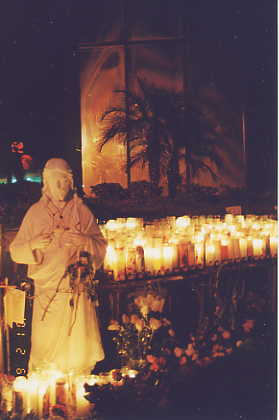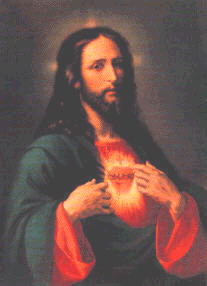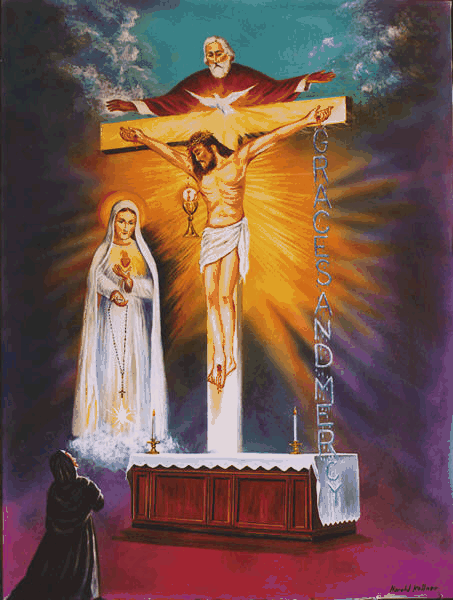Jesus wants them to go there.
They will get great graces.
Many people go to extremes when using foods.
Some diets say stop this food entirely and that
food.
With regard to foods moderation is important.
It is important to celebrate birthdays and to
enjoy food with friends.
Eating too much of certain foods is not good.
Stopping foods entirely may very well be an
extreme situation.
I ate many times with My people and apostles.
Eating together gives great joy. Love each other.
Be happy. I am with you. Be kind and
loving to each other. Share your meals
in joy. Help each other and be kind.
Don't fall into fad diets that
could harm your health. Eat to
please your Heavenly Father. Do God's
will.
I gave you each other.
I gave you food to eat.
I love you so much.
SEVEN The Cross and Christian Life
1.
Traditional
and Contemporary Views of the Cross
The cross, or dying with
Christ, constitutes an essential and inevitable element of the Christian life. Christ has inserted the cross into Christianity, and it is not to be removed.
Christ embraced the cross in His earthly, historical existence, and He thereby
instilled the cross' dimension into the life of grace which He gives us. We
hereby are recalling a point we have made before. Our Christian life has been
structured according to the pattern established by Christ as He lived out His
own life of grace as man. Consequently, our life of grace has, among other
dynamisms, a definite thrust towards the cross. This thrust is towards the cross not as an end in itself
but as a means, for this was the function of the cross in Christ's life. The
suffering in His life, culminating in a death of agony, was a passageway to a
greater life, to the life of His Resurrection.
We can understand why the
saints have always had a tendency toward the cross. This is not their only
vibrant tendency, but it is one of them. Because of their fidelity, their life
of grace is given the proper freedom to develop according to all its basic
dynamisms, one of which is towards the proper assimilation of the cross of
Christ. It is not surprising, then, that down through the ages the Fathers,
doctors, saints, and spiritual masters have taught the doctrine of the cross.
St. Paul was one of Christianity's first teachers
of the cross. In one of his famous passages concerning the
cross, Paul tells us:
For Christ did not send me to baptize, but to preach
the Good News, and not to preach that in the terms of philosophy in which the
crucifixion of Christ cannot be expressed. The language of the cross may be
illogical to those who are not on the way to salvation, but those of us who are
on the way see it as God's power to save. As scripture says: I shall destroy
the wisdom of the wise and bring to nothing all the learning of the learned.
Where are the philosophers now? Where are the scribes? Where are any of our
thinkers today? Do you see how God has shown up the foolishness of human wisdom?
If it was God's wisdom that human wisdom should not know God, it was because God
wanted to save those who have faith through the foolishness of the message that
we preach. And so, while the Jews demand miracles and the Greeks look for
wisdom, here are we preaching a crucified Christ; to the Jews an obstacle that
they cannot get over, to the pagans
madness, but to those who have been called, whether they are Jews or Greeks, a Christ
who is the power and the wisdom of God. For God's foolishness is wiser than
human wisdom, and God's weakness is wiser than human strength. (1 Co
1:17-25).
The spiritual masters throughout history have
continued this teaching of St. Paul. There is, for instance, that great teacher
of the mystical life, St. John of the Cross. Perhaps no other writer has so
starkly and relentlessly applied the doctrine of the cross to the Christian life
as has St. John. Even those very advanced in the spiritual life seem to shudder
somewhat at the demands St. John of the Cross makes in The Ascent of Mount
Carmel and The Dark Night. But it must be remembered that if St. John speaks
starkly of the cross, he always presents such teaching as being productive of
the highest union of life and love with God. Therefore, St. John follows the
only true teaching regarding the cross. The cross should always be expressive of
one's love of God and man, and it should always lead to a growth in this love.
It is also well to point out here in regard to St. John of the Cross that he is
speaking, in the first place, to a particular class of people. His doctrine is
not to be applied in all its details to Christians indiscriminately, even though
they have seriously committed themselves to the Christian life. St. John's
teaching concerning our share in Christ's cross is only one such presentation.
There are also other ways of sharing mystically in Christ's death.
St. Ignatius of Loyola is another great master of the cross. His
spirituality has a different orientation from that of St. John of the Cross. His
teaching is meant to form apostles for various types of active involvement. His
doctrine of the cross is not as stark as is St. John's, and has different
nuances. Nevertheless, the cross has just as important a place in Ignatius'
spirituality as it does in that of St. John's. Ignatius and John, then, are merely two examples of the great
traditional masters of the spiritual life who have expressed the teaching of the
cross.
In this contemporary age of the Church, with its
sweeping changes, perhaps there are some who question the doctrine of the cross
as regards modern man. Can the teaching of the cross be applied just as
radically to the contemporary Christian as it has to Christians of the past? Can present-day ideas concerning the affirmation of the values of this
world be harmonized with the concept of the cross? Actually, we have already
given the answer. In the opening lines of this chapter we stated that Christ has
structured our Christian life by His own historical existence. That structure
established by Christ is essentially transcendent. Despite very real and
important accidental differences, this structure of the Christian life remains
essentially the same throughout the ages. At the heart of that structure is the
cross leading to life. True, as we shall soon see, the contemporary Christian,
as compared to the Christian of another age, has a somewhat different concept of
how the cross is to be implemented in this twentieth century. But the cross is
still really there.
We find Christian thinkers of our own era teaching
the same basic doctrine of the cross as did St. Paul two thousand years ago. One
cannot read Karl Rahner without being deeply impressed with the place he assigns
to the cross in his theological and spiritual doctrine. Another outstanding
example is Teilhard de Chardin. In his own life Teilhard was a man profoundly
aware of the meaning of Christian suffering. The doctrine of the cross also
holds a central place in his system of thought.1 Going outside the
Catholic ambit, we find one of the most influential Christian thinkers of our
times, the Protestant theologian Dietrich Bonhoeffer, stressing the need of the
cross.2
Contemporary spirituality sees the need for the
Christian cross.3 But it gives the assimilation of the cross its own
particular orientation. This orientation is not only toward God as He is in
Himself, but also as He is found in this world. To a considerable extent,
traditional asceticism has been concerned with preparing for union with God
primarily as He is in Himself, not as He is present in the world. Often the
involvement with the cares and values of this world was looked upon as a
hindrance to this union with God. Today, this view is disappearing, and rightly
so; for the entire temporal order has been redeemed, not only man.
One's authentic involvement with the world in
loving service, an involvement which is regulated by God's will, is greatly
conducive to union in love with God and man. God's will is the criterion
regulating the type and degree of this involvement. In summary, the main point
we wish to stress is this.
Contemporary spirituality is emphasizing that the great mass of Christians of
all vocations must to a large extent assimilate the cross of Christ into their
actual involvement with the work of Christ in the world. An ardent disciple of
this view of the Christian life is Teilhard de Chardin, who wanted not only to
love God and the world, but wanted to be united with Christ through his love of
the world.
One of the great stresses of contemporary
asceticism is to sustain the Christian in his proper
involvement with the world according to his particular vocation — we still
make allowance of course for the rare vocation of the cloistered contemplative which still calls for
withdrawal from the world. Contemporary asceticism is an asceticism which is
primarily concerned with a loving service of God through a loving service of
this world. It is an asceticism which enables the Christian to imitate
Christ as the "Man for others", a phrase popular with some
contemporary thinkers. This Christian dimension of "being for others"
has been given a great impetus by the theology of Vatican II. This theology
constantly opens up the Church to proper involvement with the world. The Church
today, perhaps more so than ever, is conscious that one of the most obvious
themes of her life is that of prolonging the witness of Christ, the suffering
servant, the man for others.
All in all, the contemporary view of the Christian
cross marks progress. It is more complete. It recognizes that we must be united
to God not only as He is in Himself, but as He has incarnated Himself in this
world. If this contemporary view of the cross is to be authentic, however, it
must also incorporate those values of the previous asceticism which
are still necessary. There can be no complete break with the past. Christianity
is an evolving life, and as with all life, it can never completely dispense with
its past. Also, the contemporary view of ascetism is open to its own peculiar
dangers, just as was the traditional asceticism. We will try to point out some
of these dangers as we now briefly discuss various forms of our participation in
the death of Christ. In the divisions which follow, clear-cut distinctions are not
intended. For instance, an act of renunciation can also be an act of penance,
but not necessarily so. The objective of the divisions is to point out that
there are various forms of sharing in Christ's death, each with its own
particular purpose; yet all forms ultimately share the common purpose of
assimilating us more closely to the death of Christ so that we might share here
and hereafter more fully in His Resurrection. As we thus participate more fully
in Christ's death-resurrection, we are also more capable of leading others to a
similar participation.
2.
Various
Forms of the Cross
a)
Christian Self-discipline
In this section we will discuss topics which have
traditionally been treated under the term mortification. We have chosen the term
self-discipline because it perhaps is more acceptable and meaningful to the
contemporary Christian.
All forms of life demand self-discipline. The
athlete has to subject himself to a rigorous training. The scholar has to
discipline himself and make many sacrifices if he is to achieve significant
academic success. The musician has to endure long hours of practice. The doctor
has to be willing to order his life to the rigorous demands of the medical
profession.
The Christian life, too, has its own form of
discipline or control. This discipline has for its comprehensive purpose the
greater assimilation of the Christian's total being to Christ. Christian
self-discipline allows for the proper development of the Christ-life in all its
dimensions. Like all forms of authentic discipline, it is at the service of
life. When it is properly exercised, Christian self-discipline helps us to grow
in our capacity to love God and man. It helps us render in Christ a more
meaningful life of service to the Father and men.
This proper, grace-inspired control over our
complete person is necessary because our various sense and spiritual faculties
do not automatically follow the lead of grace. Because of original and personal
sin, there are various tendencies within us which, if not properly controlled,
will lead us away from Christ and the proper development of our grace-life. One
of the dangers of an extreme or not completely authentic incarnational
spirituality — an aberration of which contemporary Christians must be aware
— is that it is falsely optimistic. It does not sufficiently allow for this
sinful element in man. The Christian must be willing to exercise a reasonable
self-discipline despite the considerable pain which can at times be involved.
And this control must extend to all his faculties.
As regards our intellectual lives, there are
various tendencies inimical to our Christ-life which must be disciplined. For
instance, there can be a laziness which prevents a proper pursuit of study which
is necessary for the Christian life in general and for our own particular role
in the Church. There can be an unwholesome curiosity which leads us to know that
which is more pleasing, rather than first of all to know that which is
necessary. There is an intellectual pride which can manifest itself in various
ways. Some people find it extremely difficult to be open to the ideas of others,
or to admit their mistakes. The most serious form of intellectual pride, of
course, is that which can cause the loss of faith, a pride which prevents the
person from any longer submitting to God's revelation.
The Christian's will, the decisive faculty in man,
must receive special attention. It must become both supple and strong. It must
be supple in order to be open to the varied movements of the Holy Spirit. The
will, under grace, must also have the strength to guide the whole man, including
those forces which can so powerfully at times lead away from God. As far as
concrete decision-making is concerned, there are two extremes which we must
avoid. On the one hand, we must avoid precipitous action which is devoid of
reflection. This reflection is rooted in an appropriate openness to the
movements of grace. On the other hand, we must not fall prey to the habit of
indecision. Some people are prone to spend much too long in making decisions
over the simplest matters. Life is short, and we must train ourselves to make
decisions after appropriate reflection. In many of our ordinary actions and
decisions this reflection is instantaneous. Unhealthy fear and other factors
which are responsible for indecision must be curbed despite the even great pain
this can cause at times for certain temperaments.
The Christian's remaining interior faculties, those
of memory and imagination must also be subjected to proper discipline. These two
faculties can be of great value when properly guided. If they are not properly
controlled, they can, in their unruliness, become great obstacles to the proper
exercise of the Christian life. An undisciplined memory and imagination can
seriously interfere with our prayer life. A memory and imagination which are not
properly controlled can also give rise to numerous temptations against purity,
charity and the other virtues.
Man's emotional nature must also be properly
regulated under grace. A considerable portion of past spiritual literature has
not given due allowance to the role which God intends the emotions to exercise.
Therefore, when we speak of control of the emotions, we by no means are
suggesting repression or an inhuman rigidity. Rather we speak of a control which
permits the emotions to contribute to the richness and overall value of the
Christian's actions. St. Thomas teaches that the emotions or passions, when
properly integrated with the movements of the intellect and will, add to the
goodness of our acts. 4
However, as is obvious, the evil tendencies of the
emotions must be properly disciplined if they are to add their positive
contribution to the Christian life. The emotions can cause havoc if such a
discipline is lacking. They can reduce man to an almost brute existence at
times, or they can so constrict a person as to interfere seriously with the
proper exercise and development of his Christ-life. In this regard it should be
observed that the emotion of fear, if not properly controlled, can cause serious
disorders. Psychiatrists and psychologists tell us that an uncontrolled and
morbid fear is one of the chief causes of emotional and mental illness.
At the mention of emotional and mental illness we
should digress somewhat and ask ourselves this important question: Do such
disturbances interfere with growth in holiness? Not all theologians would agree
in their answer. The better opinion seems to be that which would make a
distinction between two basic kinds of holiness.5 There is a total
holiness, one which manifests itself throughout the entire being. Heroic
holiness of this type is the kind which the Church presently demands for
canonization. There is another kind of holiness which does not manifest itself
in every area of a person's being. This is the type of holiness which is
compatible with even severe emotional and mental illness. Persons thus burdened
must take the reasonable means to cure or control such afflictions, and strive
to live the Christian life as well as their condition allows. If this is done,
they can be sure they are pleasing to God, that holiness is possible for them,
and that they too can make their own contribution to the life of the Church.
We now return to the topic of Christian
self-discipline. We have discussed the control of the intellect, will, memory,
imagination and emotions. There remains a final part of one's being, bodily
nature. The body is holy, partaking in the holiness of Christ's body. But it is
not yet completely redeemed. It can be subject to numerous evil tendencies,
which, if not controlled, can weaken the life of sanctifying grace and even
destroy it. The great saints did not excuse themselves from a proper vigilance
of the body with its various senses. Neither can we. St. Paul says, "All
the runners at the stadium are trying to win, but only one of them gets the
prize. You must run in the same way, meaning to win. All the fighters at the
games go into strict training; they do this just to win a wreath that will
wither away, but we do it for a wreath that will never wither. That is how I
run, intent on winning; that is how I fight, not beating the air. I treat my
body hard and make it obey me, for, having been an announcer myself, I should
not want to be disqualified." (1 Co 9:24-27).
b)
Penance
Christian self-discipline or mortification, then, looks to
a proper control of one's total being. This control is necessary for the
avoidance of sin and the proper functioning of the life of grace. There is
another form of the cross which some people confuse with the self-discipline we
have just discussed. The form of the cross we speak of is that of penance.
Christian penance does not have the same basic
purpose as self-discipline. Christian self-discipline looks rather to the proper
living of the Christian life in the present and future, whereas penance looks to
the sinful past. Penance, therefore, is a virtue which includes a sorrow for
sin, a purpose of amendment, and a desire to make atonement or satisfaction for
sin. As with the entire Christian life, penance is primarily, although not
exclusively, an interior attitude.6
Penance, or satisfaction for sin, is an essential
part of the life of the Church and the individual Christian because both are
called upon to continue Christ's redemptive Incarnation. One aspect of Christ's
redemptive work consisted in making satisfaction for sin. This aspect of
Christ's life should always be part of the Church's existence and that of the
individual Christian. Furthermore, certain members of the Church are called to
give special attention to the prolongation of Christ making satisfaction for
sin. In this category are those who are called to a form of religious life
primarily dedicated to making reparation for sin.
The Christian in a special manner makes
satisfaction for sin in the accomplishment of the sacramental penance imposed in
confession. But he is also expected to do more than this, and the opportunities
are readily available, for the inevitable hardships and difficulties of life can
take on the value of penance. It all depends on my attitude. I can go about my
day in a spirit of love, and this is all important. But other attitudes can be
present, and should be to some extent at least. One of these attitudes or
dimensions of my Christian perspective should be that of penance, or of making
satisfaction for my own sins and those of others.
We should first of all seize the more obvious
opportunities of doing penance. To accept properly the inevitable crosses which
God permits can be an excellent form of penance. Another excellent form of
penance is to bear with the pain, effort and difficulty which we all experience
to some extent in fulfilling our life's work.
It is evident that there can be a considerable
degree of penance in my life simply through the proper living of the human
situation. But to be aware fully of the fact that I am in part a sinner, and
that I should be aware of my responsibility to make satisfaction for sin, it
seems that from time to time I have to perform additional acts of penance. The
performance of such acts of supererogation have found a constant place in the
history of Christian spirituality. As long as this manner of penance is
performed with Christian prudence, there is no reason for saying that such a
practice is no longer relevant.
c) Renunciation
The Christian life contains a manifest element of
renunciation. This is evident from a reading of the New Testament. Among other
places, this can be observed in the gospel of the gentle evangelist, St. Luke.
He puts forth with a peculiar intransigence Christ's message of renunciation.7
This was a message which Christ Himself lived. Renunciation was by no means the
only aspect of Christ's life, but it was an undeniable one. The Christian, the
follower of Christ, must also include renunciation in his life regardless of his
vocation. We remind ourselves that the cross is always intended to be connected
with life and love. Paradoxically, then, renunciation is embraced for the sake
of life. This was its purpose in Christ's life. This must be its purpose in the
Christian's existence also. We will now consider various ways in which the
principle of Christian renunciation applies.
The first two forms of the cross which we have
discussed, self-discipline and penance, do not necessarily always include the
aspect of renunciation. For instance, I can exercise Christian self-discipline
in the positive use of created goods. There is no renunciation here. I rather
relate properly to a created good according to God's will. However, renunciation
is sometimes connected with the question of self-discipline or mortification. I
cannot always properly relate my total being to God's creation unless from time
to time I am willing to renounce particular goods and values. Consider this
example. I will not always properly employ my external senses in using God's
creation unless at times I deny the senses what they naturally desire. If we are
not willing to admit this, it seems that we are falsely optimistic
concerning human nature. Human nature has been redeemed, but not yet completely;
it still has its sinful element which inclines us to a misuse of creation. To
control this tendency towards misuse, there must be some renunciation of those
goods towards which my various spiritual and sense faculties are orientated.
Christian self-discipline, then, although not equated with renunciation, does
utilize it at times.
The same is true concerning the practice of
penance. As indicated above, there are various opportunities for penance which
do not involve renunciation. But I can also perform an act of penance by the
renunciation of some good. Neither can the practice of penance, therefore,
always be equated with renunciation, although the latter is one of penance's
possible forms.
Christian renunciation can be employed in the
exercise of self-discipline and penance. But it has other applications also. The
choice of a particular vocation and life's work demands a renunciation of
various other created goods and values. The Christian who chooses to be a doctor
has to be willing to sacrifice numerous positive values if he is to serve
mankind properly in the medical profession. The Christian scholar, called by God to make a significant
contribution to the life of the Church in the academic sphere, must also learn
the lesson of renunciation; for he cannot be true to his demanding work unless
various human values, good in themselves, are sacrificed.
There are still other possibilities for the use of
Christian renunciation. One of these is the fact that its exercise gives an
unique expression to the transcendent aspect of the Christian life. One element
of the transcendent perspective is that our life of grace is a participation in
the transcendent life of God Himself. This life of grace has a radical thrust of
desiring God as He is in Himself. This particular dimension of our grace-life
will not be completely satisfied until we achieve the beatific vision. In this
vision we will possess God as He is in Himself, without the mediation of the
world. Here below we can, to a certain extent, go out to God as He
is in Himself. One way we can do this is through renunciation. Speaking of this
type of renunciation which is expressive of transcendent love of God, Rahner
observes: "For such renunciation is either senseless or it is the realized
and combined expression of faith, hope and charity which reaches out towards God
precisely in so far as he is in himself, and without any mediation of the world,
the goal of man in the supernatural order."8 God, then,
not only wants us to seek Him as He is immanent in creation and redemption, but
also as He is transcendent in Himself. One way we can achieve this transcendent
union with God is through the prudent, periodic renunciation of created goods
and values.
There is one final perspective of Christian
renunciation we would like to discuss. It is a dimension which has been included
in what we have already said, but which we would now like to emphasize. The
dimension we speak of is the peculiar redemptive force which authentic
renunciation possesses. We see this to be true by a consideration of Christ's
life. Everything in the life of Christ contributed to our redemption. He
redeemed us by His teaching, by His hidden life, by His miracles, by His correct
use of His Father's creation. In a very special manner He also redeemed us
through the renunciatory element of His existence, a renunciation which
culminated in His giving up what is dearest to any man, life itself. Central to
Christ's redemptive work was an act of radical renunciation of the highest
natural good.
The role of renunciation in the redemptive process
has been established by Christ Himself. The People of God must respect this
truth as they help Christ to carry on the work of the subjective redemption. In
so many ways we must work with Christ. One manner is through a positive
involvement with the world. We relate to its various created goods and values in
order to assimilate these into the mystery of Christ more and more. But amidst
all the ways by which we help further the redemptive process, let us give a due
place to renunciation. If we do not, we are being disloyal to the plan of
redemption as structured by Christ Himself. Perhaps we present-day Christians
need to be reminded of this in a special manner. We say this because
contemporary spirituality, so wonderfully incarnational, is open to the danger
of becoming falsely incarnational. Among other possibilities, it would become
falsely incarnational if, in its positive affirmation of this world, it
neglected to continue the renunciatory perspective of Christ's life. We have to
guard against the temptation of becoming erroneously practical about
Christianity. On the one hand, we must be authentically practical to the
greatest extent possible in our work for Christ. This in part means an
assimilation of the cross so that it meets today's apostolic needs. On the other
hand, we cannot become so pragmatic that we substitute a worldly wisdom for the
folly of the cross. There is a danger today of making asceticism so functional
that we are tempted to omit those forms of the cross which are not seen to have
an immediately practical result. Such an attitude towards the cross is one which
strives to confine the doctrine of the cross to the narrow limits of our reason.
Such an attitude wants to remove all mystery of the cross. In summary, we must
be sure to assimilate Christ's death, or His cross, according to the forms
established by Him, and one of these forms is renunciation.
d) Passive
Suffering
The forms of the Christian cross which we have discussed to
this point are more active than passive. We are not saying that these forms
cannot contain a passive element, but the emphasis lies in our active effort
assisted by grace. There is another form of the cross which is noticeably more
passive. We speak here of the various sufferings which God permits
in our lives. These sufferings we do not actively choose, but we rather endure
them according to God's will. Like all forms of the cross, this type of
suffering serves more than one purpose. As I properly relate to it, it is
expressive of my love of God and man, and in its own way it promotes Christ's
redemptive work. At the same time such suffering helps purify the Christian
person. This purification gives an increased capacity to receive God's love. It
results in an increased capacity to love God and man. In terms of the paschal
mystery, it leads to a greater share in the Resurrection.
There are numberless examples of passive trial or
suffering. There are those connected with family life. Parents can suffer
unspeakable grief because of the moral degeneration of one of their children. A
wife loves her husband deeply, but his love for her grows cool and eventually
seems to disappear. Only a woman who has been exposed to this experience knows
the depths of the suffering involved. Children also are vulnerable to familial
suffering. For instance, a young son is in need of his father's love and
interest. However, he senses that this is lacking. His father seems more
interested in making money than in loving his children.
All other vocations have their share of suffering
also. There is the single girl who one day realizes with a crushing suddenness
that she will most probably never be asked to marry. This sense of being
unwanted can, at least temporarily, be a traumatic experience. There is the
young priest who feels completely misunderstood by his bishop and pastor. There
is the religious woman who lives under a superior who makes life unbearable. The
list of possible sufferings to which the various states of life are exposed
could be extended endlessly.
There are other sufferings which can be common to
all vocations. There is physical and mental illness. There can be loneliness,
misunderstanding, a certain failure and disappointment in one's work, a lack of
being loved. There can be severe temptations. There can be various interior
trials connected with the growth of the Christ-life. These trials can be quite
intense at times, even though we are not called upon to endure the classical
night of the senses and spirit. (In our final chapter we will briefly discuss
these nights. If some do indeed experience this mystical purgation, it is not
necessary that all be led this way, even though they aspire to the highest
holiness.) Some of these trials which are commonly concomitant to the
development of the life of grace are prolonged dryness in prayer, periods of
desolation, and purification of the virtues, especially those of faith, hope and
love.
We should take the grace-inspired means to improve
the situation in all these various sufferings. To the extent that we cannot, we
should bow our head in loving conformity to the Father's will. In this way we
will derive profit from the suffering, both for ourselves and for others. We
miss a precious opportunity to the extent that we do not thus conform to the
Father's will in suffering. The great tragedy about human suffering is not that
there is so much of it, but that so much of it is wasted.
Finally, with the help of grace we have to try to
realize with a growing clarity that suffering, even deep suffering, is not
incompatible with peace and happiness. The lives of the saints prove this. And
our own lives prove this paradox; for we, too, have experienced that if we
properly relate to suffering we can simultaneously experience a peace and
happiness in the depths of our being. This is the peace and happiness of Christ,
a fundamental peace and happiness which nothing can take from us. St. Paul tells
us: "I want you to be happy, always happy in the Lord; I repeat, what I
want is your happiness. . . . There is no need to worry; but if there is anything
you need, pray for it, asking God for it with prayer and thanksgiving, and that
peace of God, which is so much greater than we can understand, will guard your
hearts and your thoughts, in Christ Jesus." (Ph 4:4-7).
e) Selflessness
There is one final form of the cross we wish to discuss.
This we may call selflessness. It is not a selflessness which destroys or denies
my true self; rather it is that form of self-denial which allows me to go out of
my selfishness and self-centeredness. It is that selflessness which allows me to
develop my total Christian existence to its God-intended fullness.
Paradoxically, I become a complete Christian person by going out of myself and
more and more into a greater assimilation with Christ. Yes, I become my true and
unique self by allowing Christ to live in me ever more perfectly. "He must
grow greater, I must grow smaller." (Jn 3:30). To grow in union with Christ
demands effort. To love the Father and men more perfectly, in, with and through
Christ, demands effort. In other words, all this demands the selflessness of the
cross. Christ tells us, "If anyone wants to be a follower of mine, let him
renounce himself and take up his cross and follow me. For anyone who wants to
save his life will lose it; but anyone who loses his life for my sake will find
it." (Mt 16:24-25).
This kind of biblical self-denial or selflessness
includes all the forms of the cross we have already discussed. It embraces any
form of the cross which can possibly be conceived. Furthermore, it allows other
forms of the cross to grow qualitatively if not quantitatively. For instance, my
acts of Christian self-discipline or renunciation are not meant constantly to
increase according to their material or quantitative aspect. This dimension
tends to reach a certain level and remain fairly constant. But the love and the
selflessness with which I permeate these forms of the cross can increase
indefinitely. Again, such selflessness demands effort, and is the cross also.
Let us emphasize certain very important truths as
we conclude our discussion of the Christian cross. First of all, our
participation in Christ's cross, or in His death, is always to be linked
intimately with His Resurrection. Yes, for us, as with Christ, the cross means
life. Our proper assimilation of the cross is one means of expressing our life
in Christ. It is also a means for a growth in this life. The more we die
mystically with Christ, the more we share in His Resurrection through grace.
Furthermore, since growth in grace means growth in love, the cross enables us to
increase our capacity to love God and men.
Secondly, to assimilate the cross of Christ does
not mean that I cannot be intimately involved with the world. It does not mean
that I cannot affirm the values of this world. It does not mean that I cannot
love this world passionately. In fact, I should passionately love this world
with all its authentic values. Why? Because this world belongs to Christ. He
paid the great price of His own blood to redeem it. Consequently, I should love
the world more, not less, than the non-Christian. But properly to love the world means to embrace the cross of Christ in
its various dimensions. If I relate to the temporal order in this manner, I will at the
same time also be growing in my capacity to love the world. For the cross, as it
purifies the Christian, enables him more freely to love and affirm this world.
He does not love and affirm this world as does the one who is enslaved to it.
Such a person loves the world for more or less selfish reasons,
and in his selfishness he is really not free to love it as he should. It is not
such a person who really loves this world and is best able to promote the true
progress of man. The person who can best love man and his world and contribute
to its progress is rather he who, purified by the cross, can
relate to man's world in freedom and selfless love.
Thirdly, to enter into the death of Christ does not
mean an absence of joy, peace and happiness. The cross is not meant to crush out
my enthusiasm for life. This is not to say that the cross cannot cut deeply at
times, but even then there can coexist a substantial peace in the depths of the
soul, even though its surface is experiencing sorrow and pain. If I properly
conform to these times of special suffering, ultimately I will experience a
special growth in the peace and joy of Christ. And remember, Christ always
apportions the cross according to one's strength.
Christ has shown us how to bear life's cross. He
was the happiest of men, and yet there was suffering and hardship in His life.
This suffering reached an extreme measure in His passion and death. But even in
this cruel culmination of His life, there was a poignant beauty, because Christ
knew how to suffer, and He knew how to suffer because He knew how to love.
Isaiah the prophet tells us about the suffering Christ. He tells us how Christ
was to suffer and through His cross achieve a new life for Himself and mankind. His words can
inspire us to assimilate Christ's cross so that we might aid in continuing its
life-giving function for ourselves and others: "As the crowds were appalled
on seeing him — so disfigured did he look that he seemed no longer human —
so will the crowds be astonished at him. . . . Without beauty, without majesty (we saw him), no looks
to attract our eyes; a thing despised and rejected by men, a man of sorrows and
familiar with suffering, a man to make people screen their faces; he was
despised and we took no account of him. And yet ours were the sufferings he bore, ours the sorrows he carried . .
. he was pierced through for our faults,
crushed for our sins. . . . Harshly
dealt with, he bore it humbly, he never opened his mouth, like a lamb that is
led to the slaughter-house, like a sheep that is dumb before its shearers never
opening its mouth. By force and by law he was taken; would anyone plead his
cause? Yes, he was torn away from the land of the living; for our faults struck
down in death. . . . His soul's
anguish over he shall see the light and be content. By his sufferings shall my
servant justify many. . ." (Is 52:14-53:11).
_______
1. Cf. Pierre Teilhard de Chardin, The Divine Milieu (New York:
Harper & Row, 1965), pp. 101-104.
2. Cf. Dietrich Bonhoeffer, The
Cost of Discipleship (New York: Macmillan paperback, 1966), pp. 95-104.
3. For one particular discussion
concerning contemporary asceticism see E. Larkin, "Asceticism in Modern
Life" in Concilium, Theology in the Age of Renewal, Vol. 19 (New
York: Paulist Press, 1966), pp. 100-108.
4. St. Thomas Aquinas, S.T., I-II, q. 24, a. 3.
5. Cf. P. Fransen, Divine Grace and Man (New York: New American Library,
1965), pp. 202-204.
6. Cf. R. Schnackenburg, The Moral Teaching of the New Testament (New
York: Herder & Herder, 1967), p. 26.
7. Cf. Eugene Maly's article in Contemporary New Testament Studies,
edited by Sister M. Rosalie Ryan, C.S.J. (Collegeville, Minnesota: Liturgical
Press, 1965), p. 201.
8. Karl Rahner, Theological
Investigations, Vol. III (Baltimore: Helicon, 1967), pp. 51-52.






 Mary's
Message from the Rosary of August 27, 1996
Mary's
Message from the Rosary of August 27, 1996










